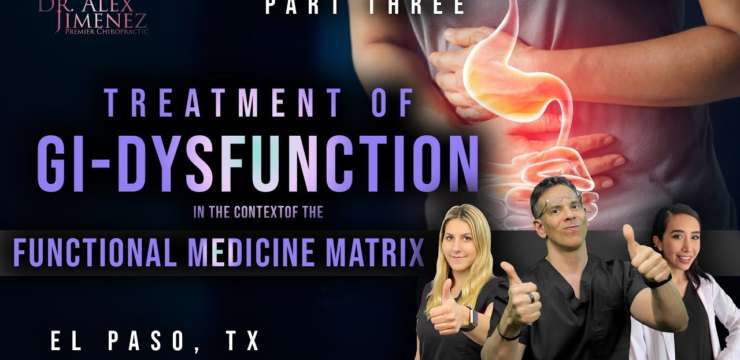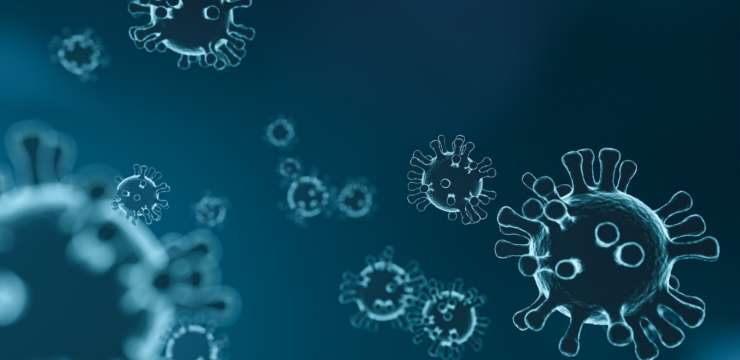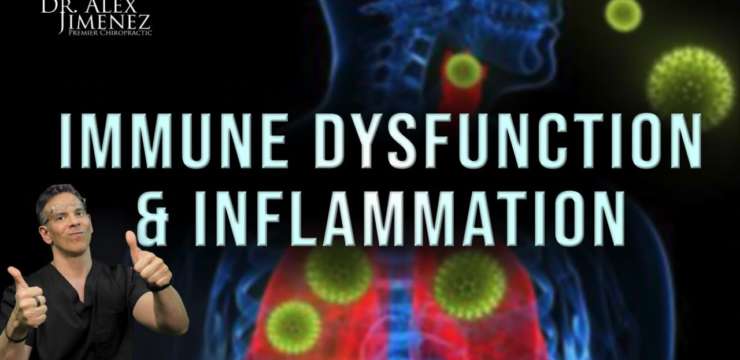Welcome to our new Functional Medicine series, brought to you by Dr. Alex Jimenez. In this edition, we feature part three of a presentation titled…

Functional medicine is an evolution in the practice of medicine that better addresses the healthcare needs of the 21st century. By shifting the traditional disease-centered focus of medical practice to a more patient-centered approach, functional medicine addresses the whole person, not just an isolated set of symptoms. Functional medicine practitioners and health coaches spend time with their patients, taking a detailed history, listening to their background and stories, and looking at the interactions among genetic, environmental, and lifestyle factors that can influence long-term health and complex, chronic disease. In this way, functional medicine supports the unique expression of health and vitality for each individual.
By changing the disease-centered focus of medical practice to this patient-centered approach, our physicians are able to support the healing process by viewing health and illness as part of a cycle in which all components of the human biological system interact dynamically with the environment. The human body all acts together. There are many systems but they all influence each other to maintain homeostasis. Functional medicine takes this understanding of the body and instead of sending the patient to multiple specialists for each system, it treats the body as a whole. This process helps to seek and identify genetic, lifestyle, and environmental factors that may shift a person’s health from illness to well-being.

Welcome to our new Functional Medicine series, brought to you by Dr. Alex Jimenez. In this edition, we feature part three of a presentation titled…

Once again, traditional Chinese medicine and herbal medicine are coming back to treat chronic conditions’ underlying cause potentially. Consequently, Chelidonium majus L., commonly known as…

Licorice is a widely researched root; it provides health benefits, and these have been applied in herbal medicine for thousands of years. Its main active…

The growing evidence about the clinical application of naturally occurring phytochemicals has revealed multiple phytochemicals’ detoxifying properties. Curcumin, commonly known as turmeric, has previously reported…

When a migraine hits, it can take you out anywhere from 2-72 hours. Often times, individuals report their migraines consist of a pulsating feeling and sensitivity to light. In fact, many who suffer from migraines report an “aura†before the migraine begins. An “aura†is a visual change (lights, the shape or size of an object, or dark spots in line of vision), auditory changes, and something deja vu, tingling, or strange smells. Â
Migraine Risks
Those with migraines typically make less nitric oxide. In women, that increases their chance of myocardial infarction, strokes, and angina two times more likely. In men, 42% of them who have migraines, had heart attacks.Â
The inside coating of a blood vessel is referred to as vascular endothelium. It is made up of endothelial cells. The purpose of a healthy endothelium is to suppress inflammation, prevent clots, and keep blood flowing. If the endothelium becomes damaged, its function becomes compromised. Those with migraines showed a decreased number of endothelial functions.
GeneticsÂ
One thing that sets functional medicine apart from traditional medicine is the lab work and genetic consideration. We work with many high tech diagnostic lab companies to determine the underlying cause of symptoms. In fact, there is a specific genetic mutation that leads to elevated homocysteine levels. It is MTHFR 677- the methylation gene. In fact, many patients who suffer from migraines have a family history of it. Â
We can break down a migraine even further and look at how it affects the rest of the body. Oxidative stress is a free radical that floats around the body. Oxidative stress is normal and necessary but too much of it begins to cause issues. In migraine sufferers, there is an increase in superoxide dismutase and elevated levels of catalase.Â
NutritionÂ
The standard American diet has done nothing but increase migraine factors. The foods consumed negatively influence gene expression as well as contribute to obesity. Many individuals have success when they switch from the standard American diet to the paleo diet. This diet gets rid of gluten and grains and patients tend to see improvement quickly. On top of this, they are now providing their bodies with the proper nutrients and healthy fats for optimal function. Here is an article that provides more information on acute migraine strategies.Â
InBodyÂ
We are able to create personalized nutrition plans for your body as well as determine other predisposing factors with the help of the InBody 770 system. This advanced machine provides a great deal of information for us regarding the patient. We track patients Anthropometric measurements in order to determine their lean muscle mass, fat density, visceral fat (fat surrounding the organs- a key indication of disease risk), water percentage, and height and weight. We measure our patients every 8 weeks and keep a detailed record. These reports are great indicators for health and also assess inflammation and edema.

The utilization of natural antioxidants to reduce oxidative stress is a promising therapeutic approach to prevent diseases by reducing ROS. Flavonoids, phenolic compounds, antioxidant vitamins…

Metabolic and chronic disorders have created a tremendous economic burden in developed and developing countries. The overproduction of reactive oxygen species (ROS), proinflammatory cytokines, and…

There are over 80 different autoimmune diseases. An autoimmune disease is when the body is so inflamed from the inside, it begins to turn on itself and begins to attack its own cells. What the body attacks determines what autoimmune disease an individual has. Some diseases that are associated with autoimmune conditions are Rheumatoid arthritis, lupus, and fibromyalgia.
Causes
There are different events and circumstances that bring on an autoimmune disease. It varies from person to person. However, it has been shown that environmental exposures are linked. Environmental exposures occur when we breathe in poor quality air and eat food that has been sprayed with pesticides and chemicals. It is referred to as an antigen overload.
Antigens
An antigen is a substance that enters the body. However, when this antigen enters the body the body reacts by producing antibodies. Similar to what happens when you get a vaccine. However, these substances that enter the body are not ones that we want a reaction to. Antigens can include things like toxins and bacteria.

Liver health and function are tied to an intricate web that comprises the gut microbiome, absorption, transport, end products of metabolism, and kidney. Indeed, the…

Part of natural healing and using functional medicine as an approach to discover the underlying reasons for health conditions involves evaluating possible causes. To find what is causing a patient’s hypertension, functional practitioners need to consider:
Magnesium deficiencyÂ
Depressed testosterone
Bacterial infections
Viral infections
Mercury toxic exposure
Detoxification compromise
Taurine deficiencyÂ
Fatty acid imbalanceÂ
Kidney dysfunctionÂ
Antioxidant insufficiencyÂ

The obesity pandemic has put the world population to the test. Once considered an esthetic condition now is a significant risk factor for insulin resistance.…

Several herbal species to treat the underlying causes of cardiometabolic disturbances with effective results have been used widely. Accordingly, cinnamon Verum (family Lauraceae) has been…

Mexican traditional medicine has left empirical knowledge about herbs, plants, and barks to use in critical or chronic conditions. Nevertheless, all of this information passed…

Clinical studies between body composition and chronic conditions have been made, mainly focusing on adipose tissue content and metabolic derangement. Nevertheless, a new scope has…

In this new functional medicine episode Dr. Alex Jimenez brings to you this part 2 of 3 of a presentation titled “Immune Dysfunction and Inflammation:…

In this new functional medicine episode Dr. Alex Jimenez brings to you this presentation titled Immune Dysfunction and Inflammation: A primary Mechanism of Illness where…

The prevalence and effects that obesity can cause on the human body and health are a big concern in the health care system. It is…